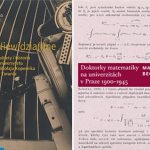 Virtual platforms „Gender History of Central and Eastern Europe“ and „HPS.CESEE: History of Science in Central, Eastern and Southeastern Europe“ (Web)
Virtual platforms „Gender History of Central and Eastern Europe“ and „HPS.CESEE: History of Science in Central, Eastern and Southeastern Europe“ (Web)
Time: 27.01.2022, 18:00-20:00 CET, 20:00-22:00 MSK, 12:00-14:00 EST
Venue: virtual space, via Jena
In this book talk Jan Surman (Prague) will join with Aleksandra Derra (Torun), Anna Maria Kola (Torun) and Martina Becvárová (Prague) to discuss their recently published books in a discussion moderated by Adela Hîncu (Jena).
Taking examples from both books as the point of departure, the participants will discuss not only spaces for women in the academia, but also historians‘ strategies to question the narrative of masculinity of universities. The discussion is part of a series of open zoom events aiming to foster the discussion of new books and approaches within the history of science and scholarship (broadly understood) in Central, Eastern and Southeastern Europe. The meeting is free and open to the public. To receive the link, please register at at the Website (Web) or write to hps.cesee@gmail.com.
Books
- Aleksandra Derra, Anna Maria Kola and Wojciech Piasek (eds.): Niewidzia(l)ne. Kobiety i historia Uniwersytetu Mikolaja Kopernika w Toruniu [The Unseen Women and history of Nicolaus Copernicus University in Torun], Torun 2020.
- Martina Becvárová : Doktorky matematiky na univerzitách v Praze 1900–1945 [Female Doctors of Mathematics at Universities in Prague 1900-1945], Praha 2019.
Participants
Martina Becvárová (Prague) is mathematician and historian at the Czech Technical Univ. in Prague. She works on history of mathematics in Bohemia and Czechoslovakia, as well as on international contacts between mathematicians. Her most recent publications dealt with history of women in mathematical disciplines at Prague universities, and with history of mathematics in the interwar period.
Aleksandra Derra (Torun) is philosopher, translator, and philologist and works at the Institute of Philosophy of the Nicolaus Copernicus Univ. in Torun. Her work focuses on gender, subjectivity, and body problems in contemporary philosophy and cognitive science. Her publications are located within the field of contemporary feminist philosophy and (feminist) science and technology studies.
Anna Maria Kola (Torun) is assistant Professor and Vice Dean at Faculty of Philosophy and Social Sciences, Nicolaus Copernicus Univ. in Torun. She specialises on elite education in Poland and in the world, and pursues research in the field of higher education and science and social work. Most recently she has been expert in the Micro-credentials consultation group established by the European Commission.
Jan Surman (Prague) is a historian of science and scholarship, focusing on Central and Eastern Europe in the 19th and early 20th centuries. His work was concerned with history of universities in the Habsburg Empire and with history of scientific languages. Currently he works at the Czech Academy of Sciences in Prague with projects on transnationality of Central European science in the 20th century.
Adela Hîncu (Jena) studied world and comparative literature at the Univ. of Bucharest and modern history at Central European Univ. She received her PhD in Comparative History from CEU in 2019 with a dissertation on the history of social thought and sociology in state socialist Romania („Accounting for the ‚Social‘ in State Socialist Romania: Contexts and Genealogies, 1960s–80s“). Currently she is research fellow at Imre Kertész Kolleg Jena.
Source: H-Net Notifications
